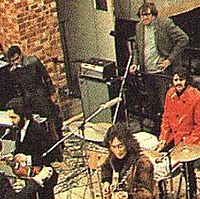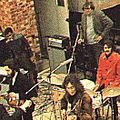Mal Evans facts for kids
Quick facts for kids
Mal Evans
|
|
|---|---|
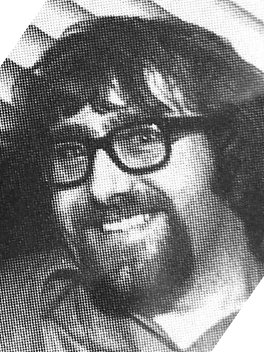
Evans circa 1970
|
|
| Born |
Malcolm Frederick Evans
27 May 1935 Liverpool, England
|
| Died | 5 January 1976 (aged 40) Los Angeles, California, U.S.
|
| Cause of death | Shot by police |
| Occupation |
|
| Years active | 1962−1975 |
| Known for | The Beatles' assistant and road manager |
| Spouse(s) |
Lily Evans
(separated 1973) |
| Children | 2 |
Malcolm Frederick Evans (born May 27, 1935 – died January 5, 1976) was an English road manager and personal assistant. He worked for the Beatles from 1963 until they broke up in 1970.
In the early 1960s, Evans was a telephone engineer. He also worked part-time as a bouncer at the Cavern Club. The Beatles' manager, Brian Epstein, later hired Evans as the group's assistant roadie, along with Neil Aspinall. Evans became a constant friend to the group. He was with them on all their tours.
After the Beatles stopped touring in 1966, he was at almost all their recording sessions. The Beatles sometimes asked Evans to play music with them. He helped on most Beatles albums from Rubber Soul (1965) onwards, often without being officially credited. After the Beatles broke up in 1970, Evans became a record producer. He also kept working with the individual Beatles on their solo projects. As a producer, his biggest success was with Badfinger's song "No Matter What", which was a top 10 hit.
Contents
Early Life and First Jobs
Malcolm Frederick Evans was born in Liverpool, England. He grew up in Wavertree, Liverpool, and had a sister named Pam. He could also play the banjo. Not much is known about Evans' early life. He wrote his life story, Living The Beatles' Legend, and parts of it were released in 2005.
In 1961, Evans married Lily, a girl from Liverpool. They met at a funfair in New Brighton. Their first child, Gary, was born that same year. Their daughter, Julie, was born five years later in 1966.
Evans first heard the Beatles perform at the Cavern Club during his lunch break. He was working as a telephone engineer for the Post Office at the time. He became a big fan of the band, even though his favorite musician was Elvis Presley.
He became friends with George Harrison. Harrison suggested Evans to the Cavern Club's manager, Ray McFall, who needed a doorman. Evans was 27 years old and very tall, about 6 feet 6 inches. This made him good at holding back excited fans at the club's door. He was later called the "Gentle Giant" and "Big Mal".
Working with The Beatles
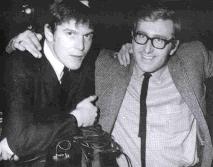
On August 11, 1963, Evans started working for the Beatles. He was their roadie and bodyguard. Evans and Aspinall drove the band's van on tour. They also set up and tested the musical equipment. Evans' experience as a telephone engineer was helpful for setting up electrical gear.
Once, in January 1963, Evans was driving the Beatles back to Liverpool from London. It was very foggy, and a pebble hit the windshield, making it hard to see. Evans had to break a hole in the glass to drive. It was winter, so the group had to huddle together in the back of the van to stay warm. Paul McCartney later called this a "Beatle sandwich".
Evans had many other jobs besides being a bodyguard. He bought anything the Beatles needed, like suits, boots, meals, or drinks. If John Lennon said "Socks, Mal", Evans would quickly go buy cotton socks for him. In 1967, Evans wrote in his diary that he "bought Ringo [Starr] some undies for his visit to the doctor".
Sometimes, when the Beatles were too busy, Evans and Aspinall would sign autographs for them. In January 1964, the Beatles started their first European tour. Evans was allowed to bring his wife and son with him.
Touring the World
The Beatles always had Evans with them on their American tours. In the summer of 1965, they played two shows in Los Angeles. Their manager, Brian Epstein, arranged for them to rest for four days in a fancy house in Benedict Canyon.
In July 1966, the Beatles toured the Philippines. They accidentally upset the country's first lady, Imelda Marcos. After this was reported on TV and radio, all of the Beatles' police protection disappeared. The group and their team had to get to the airport by themselves. At the airport, Evans was beaten and kicked. The band members were pushed by an angry crowd. Epstein had to give back all the money the group had earned before they were allowed to get on the plane.
Kenya and Sgt. Pepper
The Beatles' last concert was on August 29, 1966. But Evans continued to work for them in the studio and run errands. After recording Revolver in 1966, McCartney went on holiday to France. He met Evans in Bordeaux. They then drove to Madrid. Feeling bored, McCartney called Epstein's office and asked to go on a safari holiday in Kenya.
They visited the Amboseli Reserve and stayed at the Treetops Hotel. This hotel has rooms built on tree branches. They spent their last night in Nairobi at a YMCA before returning to London. On the flight back, Evans and McCartney played with words to find a new name for the Beatles. Evans asked what "S" and "P" meant on their meal trays. McCartney said it was for salt and pepper. This led to the name Sgt. Pepper's Lonely Hearts Club Band.
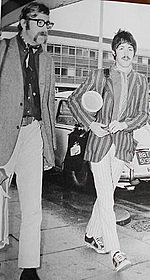
They arrived back in London on November 19, 1966. Before the Sgt. Pepper album cover could be finished, Evans and Aspinall found photos of all the people to be shown on the front.
In spring 1967, Evans flew with McCartney to Los Angeles. They visited McCartney's girlfriend, Jane Asher. The three of them went on a trip to the Rockies. They returned to LA in Frank Sinatra's private jet. Evans wrote: "We left Denver in Frank Sinatra's Lear Jet. It was a beautiful plane with dark black leather and a well-stocked bar."
Back in LA, they visited Michelle and John Phillips from the Mamas & the Papas. Brian Wilson from the Beach Boys was also there. Evans wrote about singing "On Top of Old Smokey" with McCartney and Wilson.
Greece and Magical Mystery Tour
The Beatles and Evans flew to Greece in late 1967. They were encouraged by "Magic Alex" to buy an island. The idea was that the Beatles would live on separate islands. They would be connected by tunnels leading to a central dome. Evans and his family were part of this plan. But it was dropped when McCartney decided not to participate.
In 1967, McCartney didn't have a housekeeper. So Evans moved in with him at 7 Cavendish Avenue, near Abbey Road Studios. McCartney bought his first Old English sheepdog, Martha, there. Evans often complained about the dog. Evans later bought a house in Sunbury-on-Thames. It was located between the homes of McCartney, Lennon, Harrison, and Starr.
While working on the Magical Mystery Tour film, Evans wrote about his duties. He said he would get many requests at once. He had to decide which tasks were most important. He also found time to listen to the recordings while making tea and food.
After the Magical Mystery Tour recordings, Evans flew to Nice with McCartney. They were filming a promotional video for "The Fool on the Hill". McCartney left without luggage or a passport. He got past customs by saying, "You know who I am." Later, they were not allowed into a hotel restaurant in Nice because they "didn't look the part". They had to eat dinner in Evans' room.
They had spent their money on clothes, and more money had not arrived from England. They arranged for credit at a nightclub. Evans wrote: "We took advantage of our credit. News about Paul's visit had spread, and the place was packed. Paul had built up a big bar bill. The manager demanded we pay immediately. When we explained who Paul was, he said, 'You either pay the bill, or I call the police.' It looked like we were going to jail. It was strange, sitting in a club with a millionaire, unable to pay."
India and Apple Corps
The Beatles flew to India in February 1968. They went to visit the Maharishi Mahesh Yogi's ashram. Evans arrived a few days earlier to check the ashram. When Starr got off the plane, he asked Evans to find a doctor. His shots were causing him pain.
Evans wrote in his diary about his time in India. He said he enjoyed the peace and quiet from meditation. He also liked the food. Starr, however, brought a suitcase full of baked beans with him. After leaving India, Harrison and Evans flew to New York. They visited Bob Dylan and The Band.
When Apple was started in 1968, Evans was promoted to personal assistant. His weekly salary of £38 stayed the same. Evans and Peter Asher (from Apple Records) saw the band The Iveys play. Evans kept suggesting that the Beatles sign them to the Apple label. This happened in July 1968. The Iveys became the first band signed to Apple. Some of their first recordings were produced by Evans. The band later changed their name to Badfinger.
Evans' money problems started to grow. He had to ask Harrison for money. He wrote in his diary: "Had to tell George [Harrison]—'I'm broke'. Really miserable because I'm in debt, and bills are coming in. Poor old Lil [his wife] suffers as I don't want to get a raise."
Evans was the only person from the Apple team invited to McCartney's wedding. He was a witness when McCartney married Linda Eastman on March 12, 1969. Evans wrote that he was supposed to be there at 9:45 am. But McCartney's brother, Michael's train was late. When they left after the wedding, they were surrounded by about 1,000 people.
When the Beatles played on the roof of Apple's offices, Evans was told to delay the police. The police had arrived to stop the concert.
Working with Allen Klein
Evans had an executive job at Apple until 1969. That's when Allen Klein was hired to reorganize the company. Klein fired Evans the next year. But Evans was hired back after McCartney, Harrison, and Starr complained.
On September 13, 1969, Evans went with Lennon, Yoko Ono, Klaus Voormann, Alan White, and Eric Clapton to a concert in Toronto, Canada. He wrote: "I was really enjoying myself. It was the first show I had roadied for three years. I loved plugging in the amps and setting them up. Everyone wanted the show to go well because Allen Klein had arranged for John's performance to be filmed."
Musical Contributions
Evans helped with many Beatles recordings. He sang in the chorus of "Yellow Submarine". He played single organ notes on "You Won't See Me". He also played harmonica on "Being for the Benefit of Mr. Kite!" McCartney showed Evans where the notes were on the organ. He would nod when he wanted Evans to play and shake his head when he wanted him to stop.
On "A Day in the Life", Evans controlled an alarm clock. He also was one of five piano players who hit the last chord of the song at the same time. He played tambourine on "Dear Prudence". He played trumpet on "Helter Skelter" with Lennon, even though neither was good at the instrument. Evans sang background vocals and stirred a bucket of gravel for the rhythm on "You Know My Name (Look Up The Number)". He also hit an anvil on "Maxwell's Silver Hammer". Starr couldn't lift the hammer high enough to get the right sound.
Evans' diaries suggest he helped write songs for the Sgt. Pepper album. On January 27, 1967, he wrote: "Sgt Pepper. Started writing song with Paul [McCartney] upstairs in his room, he on piano." He also wrote: "Did a lot more of 'where the rain comes in' [a lyric from "Fixing a Hole"]. Hope people like it. Started Sergeant Pepper." On February 1, he wrote: "Sergeant Pepper sounds good. Paul tells me that I will get royalties on the song—great news, now perhaps a new home."
However, Evans did not receive any royalties for his songwriting help. He stayed at his £38-a-week pay.
On Film
Evans appeared in four of the five Beatles' films. In A Hard Day's Night, he had a small role. He carried an upright bass backstage. In Help!, Evans played a confused channel swimmer. He popped up through an ice-hole in Austria and on a beach in the Bahamas.
Evans and Aspinall were asked to find actors for the Magical Mystery Tour film. They also had to rent an old 60-seater bus. They were told to paint McCartney's Magical Mystery Tour logo on it. Evans later appeared in the film as one of the magicians.
In the Let It Be film, Evans is seen playing the anvil during early versions of "Maxwell's Silver Hammer". He is also seen talking to police officers on the Savile Row rooftop. The police came to stop the Beatles' performance. Before the concert, Evans placed a camera and microphone in Apple's reception area. This was so they could film and record the police when they came to complain. McCartney later helped Evans avoid arrest. Evans often filmed the Beatles (without sound). A collection of his film recordings was later released on DVD.
After The Beatles
In 1968, Evans saw the group Badfinger (then called The Iveys) play live. He suggested they sign with Apple. Evans then produced several of their songs in 1969 and 1970. The most famous was "No Matter What", which was a top 10 hit in 1970. Evans also found the group Splinter and brought them to Apple. They later moved to George Harrison's Dark Horse Records.
Evans also produced songs for Jackie Lomax and some tracks on Keith Moon's solo album Two Sides of the Moon (1975).
Evans separated from his wife in 1973. He moved to Los Angeles. Lennon had also moved there to live with May Pang. Evans is thanked on Harrison's All Things Must Pass and the John Lennon/Plastic Ono Band album for providing "tea and sympathy". Evans also helped write "You and Me (Babe)" with Harrison. This song appeared on Starr's 1973 solo album Ringo. He also co-wrote the Splinter song "Lonely Man".
Evans was asked to produce the group Natural Gas. He was also working on a book of his memories called Living the Beatles' Legend. He was supposed to give it to his publishers on January 12, 1976. Evans was sad about separating from his wife, who had asked for a divorce. He was living with his new girlfriend, Fran Hughes, in a rented apartment in Los Angeles.
Death
On January 5, 1976, Evans was very upset. Hughes called John Hoernie, who was helping Evans write his book. She asked him to visit. During a confused conversation, Evans picked up an air rifle. Hoernie tried to take it from him, but Evans was stronger.
Hughes then called the police. Four police officers arrived. Three of them went to the bedroom. They reported that Evans pointed a rifle at them. The officers told Evans to put down the weapon, but he refused. The police fired shots, and Evans died.
Evans was cremated on January 7, 1976, in Los Angeles. None of the former Beatles attended his funeral. However, Harry Nilsson, George Martin, Neil Aspinall, and other friends were there. George Harrison arranged for Evans' family to receive £5,000. Evans had not kept up his life insurance payments and was not entitled to a pension.
When Evans' ashes were sent back to England, they were lost in the mail system. They were eventually returned to his family. When John Lennon heard about the lost ashes, he reportedly joked, "They should look in the dead letter file."
Legacy
In 1986, a trunk with Evans' diaries and other items was found in a New York publisher's basement. It was sent to his family in London. In 1992, Lennon's original lyrics for "A Day in the Life" were sold by the Evans family for £56,600.
In 2010, another sheet of paper with hand-written lyrics and notes for "A Day in the Life" was sold at auction for $1.2 million. Other lyrics collected by Evans have been part of legal cases. In 1996, McCartney went to court to stop the sale of original lyrics for "With a Little Help from My Friends". Evans' ex-wife tried to sell them. McCartney argued that Evans collected the lyrics as part of his job, so they belonged to the Beatles.
A notebook where McCartney wrote the lyrics for "Hey Jude" was sold in 1998 for £111,500. This notebook also had lyrics for "Sgt. Pepper's Lonely Hearts Club Band" and "All You Need Is Love". It contained lyrics, notes, drawings, and poems by Lennon, McCartney, Harrison, Starr, and Evans.
An actor named Nik Wood-Jones wrote and performed a play about Evans called "Beatle Mal." It first showed at the Cavern Club in 2012. In 2021, it was announced that a book about Evans, written by Beatles expert Kenneth Womack, would be published in 2023. Material from Evans' diary and archives will follow in 2024.
Images for kids
-
Neil Aspinall and Evans in 1963
-
Evans and McCartney at Heathrow airport in 1966, after their African trip
See also
 In Spanish: Mal Evans para niños
In Spanish: Mal Evans para niños


